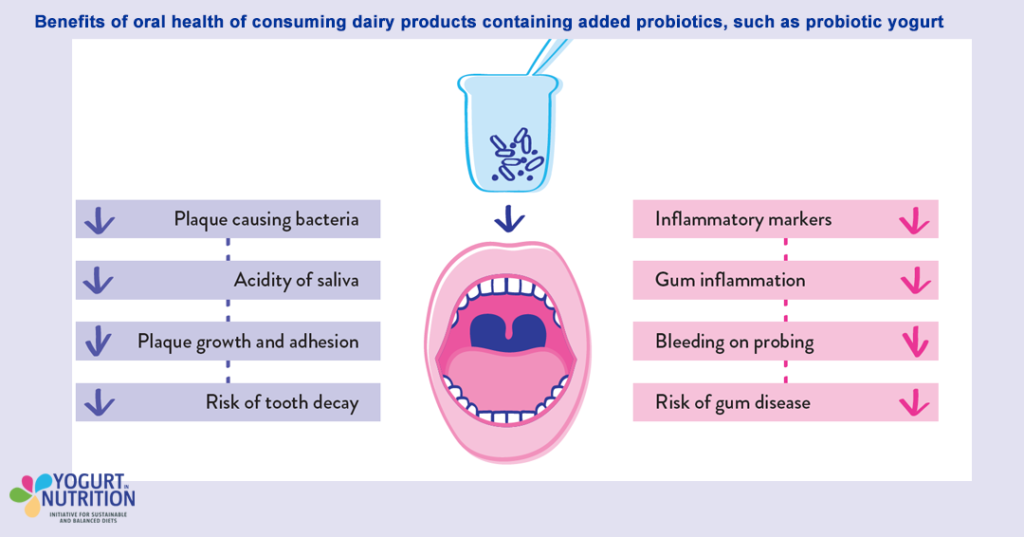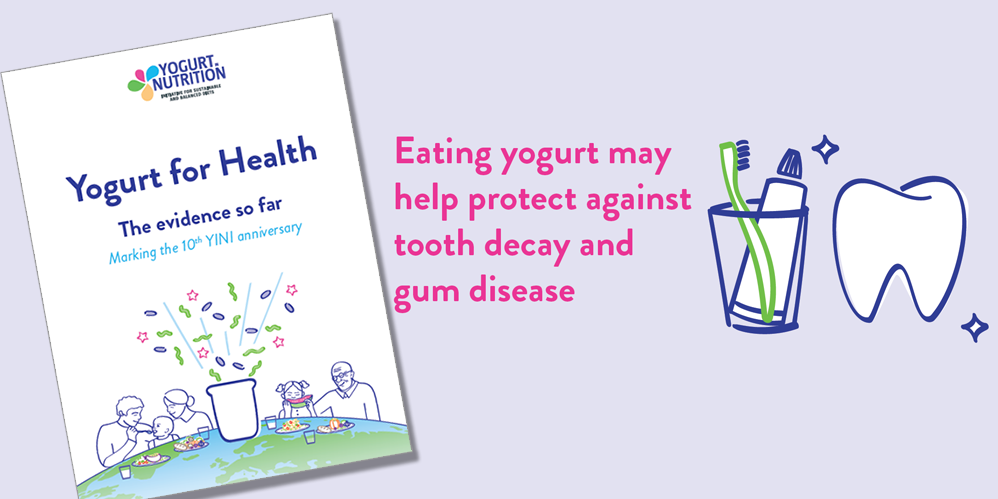Research suggests that eating yogurt can modify the mouth’s microbiome and is associated with improved oral health, helping to protect against tooth decay and gum disease – the main causes of tooth loss.
Regular yogurt consumption may reduce the risk of tooth decay and inflammatory gum disease
Adults who eat yogurt every day have a lower risk of tooth loss resulting from gum disease, compared with those who don’t eat any yogurt.
Eating yogurt daily has also been associated with a reduced risk of tooth decay among children and teenagers, compared with not eating yogurt. Several studies have shown that daily consumption of dairy products, including yogurt, is associated with improved oral health compared with less frequent consumption:
- One study showed that adults who ate or drank more than six servings of dairy food (including milk and yogurt) per week had a 24% lower prevalence of gum disease than those who didn’t consume any dairy food. This difference was reduced to just 9% for infrequent consumption of dairy food (one serving per week or less).
- Authors of one study recommended daily consumption of yogurt to improve oral health after they found that adults who ate yogurt daily were 76% less likely to have gum disease than those who ate yogurt less than once a week.
- Another study reported greater oral health improvements in children who drank Lactobacillus probiotic milk every day, compared with three times a week – these benefits remained for at least 6 months after discontinuation.
Dairy products have several protective effects against tooth decay
According to evidence from both interventional and observational studies, consuming dairy products may be associated with a reduced risk of tooth decay due to several different protective effects:
- Lactose in milk has lower potential for causing tooth decay than other dietary sugars as it is not fermented to acidic products in the mouth.
- Calcium and phosphate in milk help prevent the decay of tooth enamel and may even support remineralisation of tooth enamel.
- The proteins and fats in milk may also reduce the ability of plaque to stick to tooth enamel and produce acids. It is likely that the protective potential of plain unsweetened yogurt is similar to that of milk.
“Eating yogurt every day may contribute to improved oral health by modifying the mouth’s microbiome, reducing the risk of developing tooth decay and gum disease in both adults and children.”- Professor Sharon Donovan
The probiotic content of some yogurts may add to their oral health benefits
Several randomised controlled trials have demonstrated that yogurts containing added Bifidobacterium or Lactobacillus probiotic cultures are effective antibacterial agents against plaque-causing Streptococcus mutans bacteria.
Such probiotic yogurts were shown to reduce levels of Streptococcus mutans bacteria in the saliva and dental plaque of both adults and children.
In one study, probiotic yogurt also increased salivary pH, reducing the acidity of saliva by diminishing the acid production ability of Streptococcus mutans.
Laboratory cultures have also shown that Lactobacillus probiotic yogurt can inhibit the growth and adhesion of Streptococcus mutans bacteria.
Randomised controlled trials have shown that eating yogurt containing added Bifidobacterium or Lactobacillus probiotic cultures is associated withreductions in several markers of gum inflammation
People who ate probiotic-containing yogurts experienced greater reductions in plaque formation, gum inflammation, probing depth, bleeding on probing, and inflammatory fluids or markers, compared with those who ate non-probiotic containing yogurt.
These oral health benefits may be achieved through modifying the oral microbiome
Studies in adults and children suggest that consumption of dairy products containing added probiotics, including yogurt containing added Bifidobacterium or Lactobacillus probiotic strains, may help prevent tooth decay through modification of the oral microbiome.
Evidence suggests that these benefits are achieved due to the ability of the live bacteria in probiotic containing dairy products to modify the composition of the mouth’s microbiome, and so reduce the decay-causing bacteria that can lead to oral disease.
The characteristics of individual dairy products may also have an important role – the lactic acid bacteria starter cultures used to make fermented dairy products, such as yogurt, may also help to reduce tooth decay-causing bacteria.

For more information, check the complete publication “Yogurt from science to health”
References:
- Ma J, Furuta M, Uchida K, et al. Yogurt product intake and reduction of tooth loss risk in a Japanese community. J Clin Periodontol. 2022;49:345–52.
- Wang J, Jin G, Gu K, et al. Association between milk and dairy product intake and the risk of dental caries in children and adolescents: NHANES 2011-2016. Asia Pac J Clin Nutr. 2021;30:283–90.
- Lee K, Kim J. Dairy Food Consumption is Inversely Associated with the Prevalence of Periodontal Disease in Korean Adults. Nutrients. 2019;11:1035.
- Lee HJ, Kim SJ, Park YS, et al. Association between semi-solid yogurt intake and periodontitis in Korean adults. J Periodontal Implant Sci. 2019;49:206–14.
- Manmontri C, Nirunsittirat A, Piwat S, et al. Reduction of Streptococcus mutans by probiotic milk: a multicenter randomized controlled trial. Clin Oral Investig. 2020;24:2363–74.
- Woodward M, Rugg-Gunn AJ. Chapter 8: Milk, Yoghurts and Dental Caries. Monogr Oral Sci. 2020;28:77–90.
- Gardner E. Alternative sugars: Lactose (milk sugar). Br Dent J. 2017;223:801.
- Shaalan O, Gad HMA, Riad MI, et al. Comparison of Antibacterial Effect of Probiotic Yogurt and Xylitol-Containing Chewing Gum in Geriatric Patients: A Randomized Controlled Clinical Trial. Acta Stomatol Croat. 2021;55:380–9.
- Megha S, Shalini G, Varsha SA, et al. Effect of Short-Term Placebo-Controlled Consumption of Probiotic Yoghurt and Indian Curd on the Streptococcus mutans Level in Children Undergoing Fixed Interceptive Orthodontic Therapy. Turk J Orthod. 2019;32:16–21.
- Bafna HP, Ajithkrishnan CG, Kalantharakath T, et al. Effect of Short-term Consumption of Amul Probiotic Yogurt Containing Lactobacillus acidophilus La5 and Bifidobacterium Lactis Bb12 on Salivary Streptococcus mutans Count in High Caries Risk Individuals. Int J Appl Basic Med Res. 2018; 8:111–5.
- Ghasemi E, Mazaheri R, Tahmourespour A. Effect of Probiotic Yogurt and Xylitol-Containing Chewing Gums on Salivary S Mutans Count. J Clin Pediatr Dent. 2017;41:257–63.
- Wu CY, He SJ, Mar K, et al. Inhibition of Streptococcus mutans by a commercial yogurt drink. J Dent Sci. 2019;14:198–205.
- Yuki O, Furutani C, Mizota Y, et al. Effect of bovine milk fermented with Lactobacillus rhamnosus L8020 on periodontal disease in individuals with intellectual disability: a randomized clinical trial. J Appl Oral Sci. 2019;27:e20180564.
- Kuru BE, Laleman I, Yalnızoğlu T, et al. The Influence of a Bifidobacterium animalis Probiotic on Gingival Health: A Randomized Controlled Clinical Trial. J Periodontol. 2017;88:1115–23.
- Farias da Cruz M, Baraúna Magno M, Alves Jural L, et al. Probiotics and dairy products in dentistry: A bibliometric and critical review of randomized clinical trials. Food Res Int. 2022;157:111228.
- Nadelman P, Baraúna Magno M, Masterson D, et al. Are dairy products containing probiotics beneficial for oral health? A systematic review and meta-analysis. Clin Oral Investig. 2018;22:2763–85.
- Zare Javid A, Amerian E, Basir L, et al. Effects of the Consumption of Probiotic Yogurt Containing Bifidobacterium lactis Bb12 on the Levels of Streptococcus mutans and Lactobacilli in Saliva of Students with Initial Stages of Dental Caries: A Double-Blind Randomized Controlled Trial. Caries Res. 2020;54:68–74.
- Sarmento EG, Cesar DE, Martins ML, et al. Effect of probiotic bacteria in composition of children’s saliva. Food Res Int. 2019;116:1282–8



